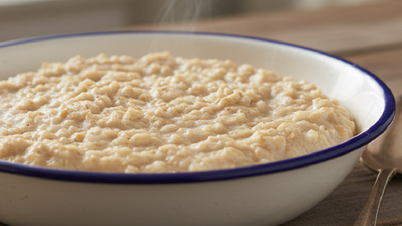If you eat less but still can't lose fat, it could be due to one or more of the following reasons:
Eat less but not in a calorie deficit
One of the biggest mistakes that makes it difficult to lose fat even when dieting is not paying attention to the quality of food. It is true that people eat less, but they choose the wrong foods, making the dishes they eat, although small in volume, high in calories. They often contain a lot of sugar and fat, such as milk chocolate or sweet drinks, according to the website Eating Well (USA).

Not getting enough sleep can make it difficult to lose weight even when dieting.
PHOTO: AI
The general principle of losing weight or fat is to have a calorie deficit. In addition, eating less and lacking protein will cause the body to lose muscle. Losing muscle slows down the metabolism, making the body consume less energy and losing fat becomes more difficult.
To fix this, people who want to lose weight should track their calorie intake using a food diary or a calorie counting app. Increase protein intake to about 1.2-2 grams/kg of body weight and choose foods rich in fiber.
Crash dieting slows down metabolism
Dieting is effective in reducing fat. But many people find that after a period of dieting, the fat loss slows down. They often respond by cutting calories more and exercising more. However, this can be a mistake.
The Mayo Clinic, a non-profit medical organization in the US, says that when you lose weight, your body simultaneously loses muscle and fat, reducing your metabolism. Because your metabolism decreases, your body can easily fall into a state of stagnation.
The solution is to avoid cutting calories too much, just create a moderate deficit. Occasionally, people should have a normal eating day to stabilize hormones, maintain metabolism and help the body recover. In addition, incorporate strength training to maintain muscle. This is a good way to stabilize metabolism.
Not getting enough sleep
An often overlooked but important factor is sleep, stress, and hormones. Lack of sleep increases cortisol, a hormone that makes the body store fat, especially in the belly area.
Poor or insufficient sleep disrupts the balance between the satiety hormone leptin and the hunger hormone ghrelin, causing us to overeat. Chronic stress also causes chronically high cortisol, leading to insulin resistance and reduced fat burning ability. In addition, some endocrine disorders such as hypothyroidism or polycystic ovary syndrome also slow down metabolism.
To improve, people should get 7-9 hours of sleep each night, maintain a consistent sleep schedule, and practice stress-reducing techniques such as meditation, deep breathing, or walking outdoors. If you suspect a hormonal disorder, see your doctor for a proper diagnosis, according to Eating Well .
Source: https://thanhnien.vn/3-ly-do-thuong-gap-khien-an-it-van-khong-giam-mo-185251021140840527.htm


![[Photo] Prime Minister Pham Minh Chinh meets with Speaker of the Hungarian National Assembly Kover Laszlo](https://vphoto.vietnam.vn/thumb/1200x675/vietnam/resource/IMAGE/2025/10/20/1760970413415_dsc-8111-jpg.webp)



![[Photo] Prime Minister Pham Minh Chinh received Mr. Yamamoto Ichita, Governor of Gunma Province (Japan)](https://vphoto.vietnam.vn/thumb/1200x675/vietnam/resource/IMAGE/2025/10/21/1761032833411_dsc-8867-jpg.webp)
![[Photo] Da Nang residents "hunt for photos" of big waves at the mouth of the Han River](https://vphoto.vietnam.vn/thumb/1200x675/vietnam/resource/IMAGE/2025/10/21/1761043632309_ndo_br_11-jpg.webp)



































































































Comment (0)